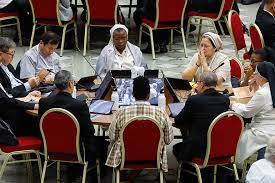~ by Christopher White, Vatican News for National Catholic Reporter
As Pope Francis’ major summit on the future of the Catholic Church enters its final week, bishops and laity were reminded of the Second Vatican Council’s emphasis on the church’s “living tradition,” including the participation and inclusion of all of the “people of God.”
 delegates commenced work on their hotly anticipated final document from the monthlong meeting, Australian Fr. Ormond Rush — one of the world’s leading scholars on Vatican II — encouraged the synod’s more than 450 members to be attentive to the “traps” of “being drawn into ways of thinking that are not ‘of God.’ ”
delegates commenced work on their hotly anticipated final document from the monthlong meeting, Australian Fr. Ormond Rush — one of the world’s leading scholars on Vatican II — encouraged the synod’s more than 450 members to be attentive to the “traps” of “being drawn into ways of thinking that are not ‘of God.’ ”
“These traps could lie in being anchored exclusively in the past, or exclusively in the present, or not being open to the future fullness of divine truth to which the Spirit of truth is leading the church,” said Rush on Oct. 23. “Discerning the difference between opportunities and traps is the task of all the faithful — laity, bishops, and theologians — everyone.”
Rush’s remarks, made during one of the synod’s occasional open sessions, drew heavily on the writings of the late Pope Benedict XVI. As Fr. Joseph Ratzinger, the future longtime Vatican official and pontiff participated in the council and served as a drafter of some of its key texts. At the time, Ratzinger articulated a distinction between so-called “static” and “dynamic” understandings of the church’s tradition.
Rush said the “living tradition” of the church, as taught by the council, is guided by the Holy Spirit through the interrelated means of the work of theologians, the lived experience of the church’s faithful and the oversight of church authorities.
“Sounds like a synodal church, doesn’t it?” Rush asked.
In recent weeks, some synod delegates have expressed skepticism over the inclusion of lay persons in the Synod of Bishops. Some delegates have also expressed frustration about the assembly’s discussion of issues — such as better inclusion of LGBTQ persons and women’s leadership in the church — that they argue have previously been settled by the church’s tradition.
Rush, who has been a theological adviser to the Vatican’s synod office, seemed to offer an indirect reply to those critics in his remarks, noting that the council taught that divine revelation is not something in the past, but rather an “ongoing encounter in the present.”
“The same God, in the same Jesus Christ, through the enlightenment and empowerment of the same Holy Spirit, is forever engaging with, and dialoguing with, human beings in the ever-new here and now of history that relentlessly moves humanity into new perceptions, new questions and new insights, in diverse cultures and places, as the world-church courses through time into an unknown future until the eschaton,” he said.
“This synod is a dialogue with God,” he told the delegates, who are now preparing to begin making recommendations for the assembly’s final report. “God is waiting for your reply.”
To read the entire article, please click here 
